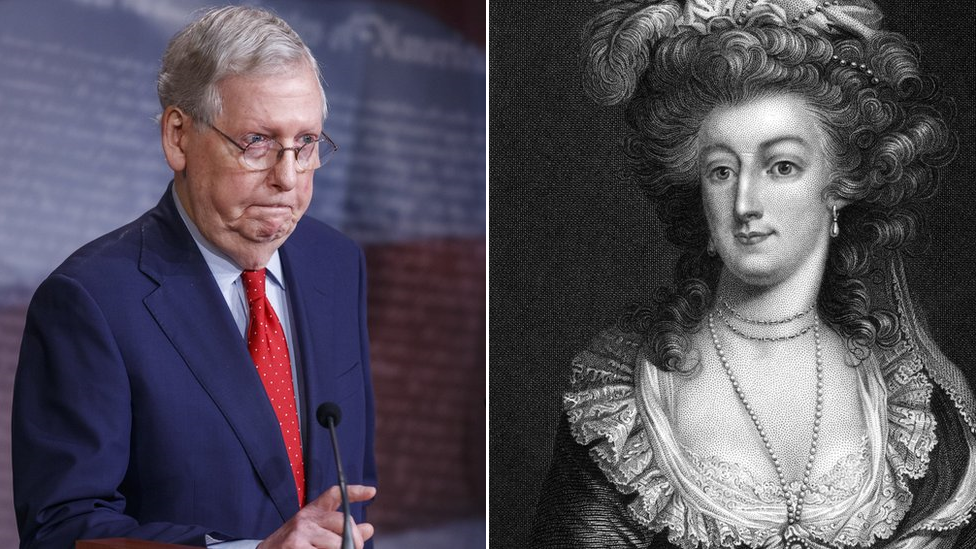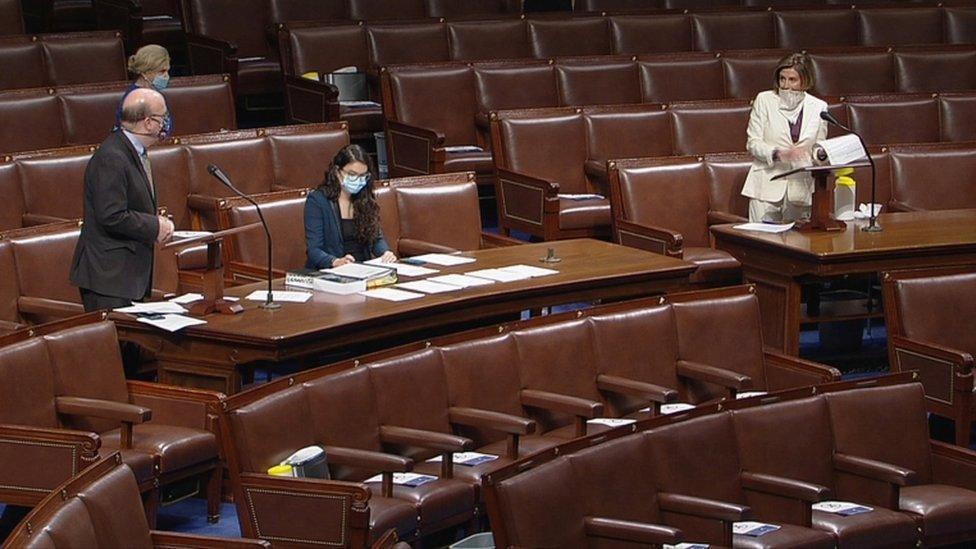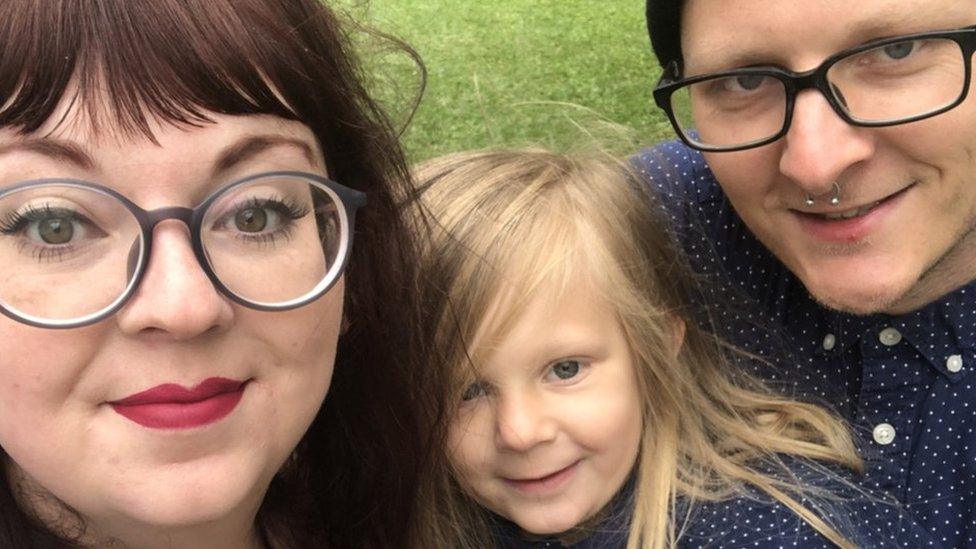Coronavirus pandemic exposes rather than heals America's divisions
- Published

Why was Mitch McConnell likened to Marie Antoinette?
Take a devastating global pandemic. Add an economic crisis featuring unemployment and negative growth on a par with Great Depression. And have it all unfold during a US presidential election year, at a time when divisions within American society and politics are particularly acute.
It's a recipe for partisan accusations, animosity and feuding - exacerbated by competing authorities at the national, state and local level, all vying to find solutions and avoid blame for the growing death toll and financial wreckage wrought by the pandemic.
Here's a closer look at the ugly way that's playing out.
Bailout or bankruptcy?
The latest example of political friction broke out after Congress passed its third coronavirus stimulus bill. The $484bn (£391bn) measure injected $310bn into a small-business aid programme that had already burned through the $349bn allocated for it in the second stimulus bill. The rest of the funds went to hospitals, coronavirus testing and more small-business grants.
Donald Trump criticised Georgia’s governor for reopening
So far, so good. Republicans had groused a bit about Democratic delays in approving the measure, but all sides agreed the money was necessary.
It's what came next that had New York Governor Andrew Cuomo using words like "stupid," "irresponsible" and "reckless".
And Republican Congressman Peter King - also of New York - referring to his own party's Senate majority leader, Mitch McConnell, as a beheaded French monarch with a reputation for callousness toward the downtrodden.
Missing from that latest stimulus bill was any money for cash-strapped states, localities and Indian tribes that Democrats sought. And on Wednesday Republican Senate Majority Leader Mitch McConnell suggested that more money for the states may not be forthcoming - and Democratic governors like New York's Cuomo had themselves to blame.
"My guess is their first choice would be for the federal government to borrow money from future generations to send it down to them now," he said in a radio interview. "That's not something I'm going to be in favour of."
Up until now, Republicans had seemed unconcerned with the trillions of dollars of additional spending Congress has authorised to address the coronavirus outbreak, leaving some Democrats angry that budgetary concerns were being cited as a reason not to help them cover their financial shortfalls.
Even more infuriating for them was McConnell's suggestion that states might be allowed to go bankrupt as an alternative to further federal aid.
"McConnell's dismissive remark that states devastated by Coronavirus should go bankrupt rather than get the federal assistance they need and deserve is shameful and indefensible," said Congressman King, a moderate Republican who is retiring at the end of this year.
"To say that it is 'free money' to provide funds for cops, firefighters and healthcare workers makes McConnell the Marie Antoinette of the Senate."
When is it safe to reopen?
Financial aid is just part of the growing dispute between the federal government and states, as well as among individual states. When, and how, to begin to lift the sweeping shelter-in-place orders that have blanketed the US have also become a contentious topic.
For nearly a month Donald Trump has said the time for an economic reboot is near. He suggested Easter, in mid-April, as a possible date, criticised states for moving too slowly to respond to the outbreak, released reopening guidelines for the states to follow, and then tweeted about "liberating" Democratic-controlled states whose shutdown orders he has criticised as going "too far".
Protests against the lockdowns have been held across the US
The president has expressed support for the growing number of right-wing-organised protests in states against the government-ordered shut-downs.
This all comes after Democratic-controlled states, such as California and Illinois, moved more quickly to institute shelter-in-place orders, while Republican-run Texas and Florida waited - and have expressed a willingness to reopen more quickly.
The harsh political reality for the president is he faces a re-election contest in just over six months, and the longer the lockdown drags on, the less time the economy will have to recover before voters head to the ballot box.
Current polling suggests he is trailing presumptive Democratic nominee Joe Biden nationally and in key battleground states, and while the race is likely to tighten and the president has abundant resources to run a robust campaign, Trump appears destined for an uphill fight.
The president also faces a flip-side risk of being seen as supporting re-opening too quickly and shouldering the blame if there is a subsequent spike in cases. That could explain why, just days after calling for states to begin reopening process, he criticised the Republican governor of Georgia for lifting restrictions on places like hair salons, bars and tattoo parlours, where social distancing guidelines would be difficult to follow.
Trump on Georgia reopening: 'I think it's too soon'
For the moment, surveys indicate majorities of both Republicans and Democrats, external view the existing stay-at-home measures as effective. As the economic consequences of the lockdown sharpen their bite, however, those opinions could change for those who are unable to work remotely or rely on consumer spending for their livelihood.
It's a difficult line for any politician to walk, and in the days ahead the stakes will be at their highest.
When the pandemic meets the culture wars
The political confrontations that have arisen, or been exacerbated, by the coronavirus pandemic are not limited to debates over the details and scope of the immediate response, either. As the president's Wednesday order suspending some forms of immigration into the US demonstrates, the crisis will very easily consume just about every other existing political and policy debate with relative ease.
The president's critics have been quick to accuse him of using the outbreak to justify draconian immigration cuts that he has backed from the beginning of his administration.
Cheese and guns: the unexpected items deemed 'essential'
Abortion rights groups have lashed out at conservative states for similar opportunism after they have used lockdown orders to shutter medical facilities that provide the procedure. Meanwhile pro-gun advocates have suggested that liberal states have violated their constitutional rights by shuttering firearm vendors.
A battle between the Biden and Trump campaigns is also brewing over which candidate has the cosiest relationship with China - which many Americans view as responsible for the global spread of the virus, external that originated in Wuhan.
In competing advertisements, both sides suggested their opponent is too soft to stand up to the Chinese government.
The exchange is just a taste of the fury that is sure to come, as close presidential contests between campaigns that rely heavily on turning out their respective political bases tend to become very nasty, very quickly.
With control of both chambers of Congress, numerous state legislatures and governorships in play, any sense of togetherness and unity of purpose will be difficult to maintain. Add in a voting population fearful for their health and economic security, and it makes for a politically unstable brew.
- Published24 April 2020

- Published16 April 2020
- Published23 April 2020

- Published24 March 2020
